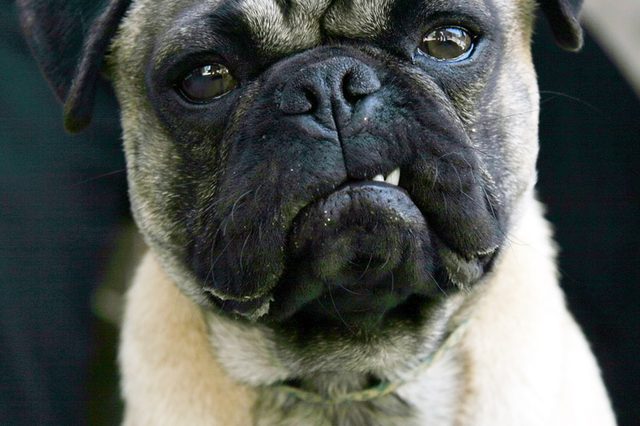Having a dog growl at you can be a surprising experience. Having your dog growl at you can be downright upsetting. Many people think you should punish your dog when they growl. I am here to tell you NOT to!!
Growls are Communication
Dogs growl as a means of communicating that they are upset. My nine-year-old Lab mix Luna will growl when she’s curled up on the couch in the evening after a long day, and her more energetic canine sister Lily approaches her with hopes of initiating a play session. Luna growls. Lily back offs (usually). And Luna can return to her peaceful slumber. No harm no foul. If Lily is particularly wound up (usually because we haven’t done our job tiring her out that day), she ignores Luna’s warnings and continues to attempt to entire her to a play session. This is where we step in, and redirect our young Lily to a toy, chew, or even a quick training session to tire her out. I appreciate that Luna is clear in her communication, and because we respect her saying “Not now, Lily”, the situation never moves beyond the growl.
Many Reasons
Dogs can growl when they are scared of a new person, when they are being handled harshly, or perhaps when they have an object they’re particularly worried about losing. They’re growl says, “Please leave me alone.” If we respect this growl, there is no need for a situation to escalate. Ignoring the growl and moving towards the dog, on the other hand, will teach your dog that they are not being heard, and that next time he’ll need to try something “louder” (barring teeth, a snap, or even a bite). I always thank a dog for using their language to tell me to stop whatever is happening. At the same time, I take note of the situation, and think about whether I can work with my dog to make them less uncomfortable in the future.
When should you hire a trainer to work with your dog?
When a dog growls to protect a bone, a food bowl, a chew toy, a couch (or bed), or a person, your dog is trying to protect his precious possession. This behavior is known as resource guarding and comes from a fear by the dog of losing the object that is so valuable to him.
I also want to work with a dog who growls when being touched, reached for, brushed, etc. This is a dog who has concerns about being handled, and we can certainly work with this dog to become more comfortable with the situation so he doesn’t need to growl to make it stop.
In the meantime, what should you do if your dog growls?
- Stop. Stop whatever it is you’re doing or the person/animal eliciting the growl is doing. If you know that your dog growls right before a bite, then move away and get safe. If you know the growl doesn’t mean a bite is imminent, stop what you are doing. Wait until your dog relaxes, and then move away, rewarding your dog for the relaxed behavior.
- Take a look at the situation. What caused the growl? Were you touching or grooming your dog? Restraining him? Taking something away from him? Approaching him?
- In these situations, working on a behavior modification plan with an experienced, certified trainer can change your dog’s feelings about the situation, and thus reduce their need to growl. Your dog CAN learn to love being groomed, and CAN learn to look up at you excitedly as you approach his food bowl.
- Science-based dog trainers use a positive training method called counter-conditioning and desensitization to help your dog feel more comfortable in these situations and even learn to love them. DO NOT hire a trainer who talks about being your dog’s “alpha” or “restablishing pack order” or any other of that nonsense. You can be sure that trainer will punish your dog for any warning growl, and your dog while suddenly become a more dangerous animal without the ability to warn you that they are uncomfortable.


Leave A Comment